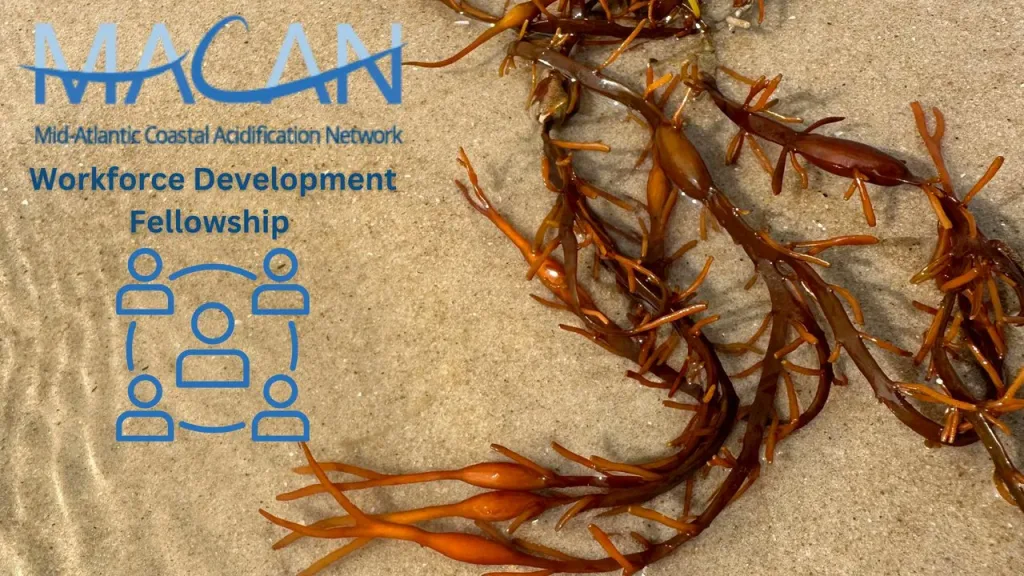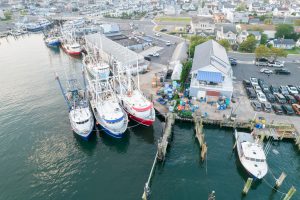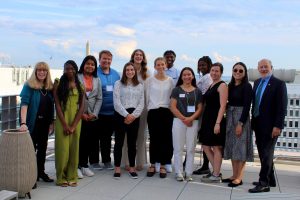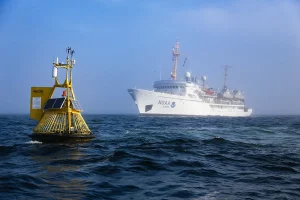Background and Fellowship Overview
MACAN (the Mid-Atlantic Coastal Acidification Network) is a virtual network of researchers, educators, decision-makers, industry representatives, policy experts, and federal, state, local, and tribal leaders whose mission is to advance knowledge and understanding of the effects of coastal and ocean acidification (COA) and promote regional collaboration to advance this knowledge. This fellowship is designed to introduce students from underrepresented minority groups to the field of Coastal and Ocean Acidification, including, but not limited to, aspects of scientific research, policy, industry, education, and/or outreach related to.
MACAN’s fellowship aims to provide an immersive, real world learning opportunity while also helping to build diversity within the field of COA. This fellowship is also intended to support a project(s) that builds on the activities outlined in the MACAN 2022-2024 Workplan. The student will interact with one or more mentors to learn about the fundamentals of COA science, policy, industry, education, and outreach.
Students will be required to work with a mentor(s), that will be determined through consultation with MACAN, and produce a final product. This product could include, but is not limited to outreach materials, a final paper, a poster presented at a meeting, or a digital data product/tool. Some travel in the Mid-Atlantic region will be required and the costs will be covered by the award. Travel opportunities will be determined during project development with MACAN, and could include visits to research laboratories, professional conferences, fishery management meetings, or other mentoring opportunities.
A stipend will be provided to the student through their college or university. Students enrolled in a two-year, four-year, or graduate program are eligible. Fellowship only available to U.S. Citizens.
This fellowship program will be open to those that identify as part of an underrepresented group as defined by NOAA, which could include but is not limited to:
- Black, Latino, and Indigenous and Native American persons
- Asian Americans and Pacific Islanders
- Other persons of color
- Members of religious minorities
- Lesbian, gay, bisexual, transgender, and queer (LGBTQ+) persons
- Persons with disabilities
- Persons who live in rural areas
- Persons otherwise adversely affected by persistent poverty or inequality
Availability of Funds
Through Bipartisan Infrastructure Law funding from the Mid-Atlantic Regional Council on the Ocean (MARCO), MACAN is offering one-year fellowship opportunities for at least two students. The fellowship will be a maximum of $35,000 which will be used to cover:
- A $10,000 – $22,000 stipend. The final offer amount will be determined by the review committee;
- Indirect university costs, which varies by institution and will be determined by MARCO during the application process; and
- Up to $10,000 for other direct expenses and travel, including but not limited to publication costs, outreach material, and software, which will be determined during the first month of the performance period.
The Fellowship performance period is from December 1, 2023 through November 30, 2024.
Laboratory and fieldwork will not be supported by this project. Additionally, any data that is used must either be obtained from a designated mentor(s) or a publicly accessible data repository.
MARCO will also reimburse the student for travel expenses, which will be determined by MACAN staff with input from the student and mentor(s) during the fellowship performance period.
This fellowship will be awarded by the Coastal States Stewardship Foundation on behalf of MARCO and MACAN, and administered through the institution where the student is enrolled.
Timeline
It is expected that the overall fellowship goals, objectives, and final deliverable products (Scope of Work) will be developed with MACAN within the first month of the performance period and final product delivered by the end of the performance period.
Scope of Work
The scope of work of the fellowship will advance one or more of the activities outlined in the MACAN Work Plan, and at a minimum will include:
- Development of a capstone project, including a description of final expected deliverables from the project, expected travel, and potential publication if applicable
- The capstone project should be one of the following: outreach materials, a final paper, a poster presented at a meeting, or a digital data product/tool.
- Regular communication between the selected Fellow(s) and (a) mentor(s) – identified in partnership with MACAN – that will advise on their final project process, delivery, and publication if applicable
- Attendance during bi-weekly MACAN staff meetings
- Attendance during quarterly MACAN Steering Committee meetings
- Presentation of the final project during a MACAN-sponsored webinar
Predesignation of a mentor(s) is not required, however, if the applicant has someone in mind, the proposed mentor(s) is welcome to submit a letter of support on behalf of the mentee(s) explicitly stating the mentor(s) willingness and commitment to participate in all aspects of the above scope of work. MACAN will provide mentorship throughout the course of the project through its network of collaborators.
Eligibility Requirements
- Undergraduate or graduate students currently enrolled in a two- or four-year college or university for the duration of the project period,
- Must be from an underrepresented minority group including, but not limited to, those groups mentioned above
- Applicant must be eligible to work in the United States
- Applicant must be able to devote, on average, at least eight hours per week to fellowship activities as listed in the scope of work
- Preference will be given to students with research interests in the Mid-Atlantic (NY, NJ, DE, MD, VA)
Application Requirements
- Written statement (maximum two-pages) addressing the questions:
- What interests you most about COA?
- How has your background or life experience influenced your research and/or career interests?
- How do your interests relate to MACAN’s work/workplan?
- How will this fellowship further your career goals?
- Maximum two-page resume with most recent experience (no COA experience required)
- Most recent unofficial transcript from the institution where the student is enrolled at the time of application
- At least three faculty and/or professional references.
Please note, an interview may be required upon initial review of application materials. Additionally, the student must provide an official transcript at the time of acceptance.
Applications are due by October 31st at 11:59 pm, 2023. Students will be notified by November 1st, 2023 with a start date of December 1st, 2023.
Please send one PDF document with the subject MACAN Fellowship Application, to: jreimer@midatlanticocean.org.
If you have any questions, please contact: Janet Reimer, Mid-Atlantic Regional Council on the Ocean Science Program Manager, jreimer@midatlanticocean.org






